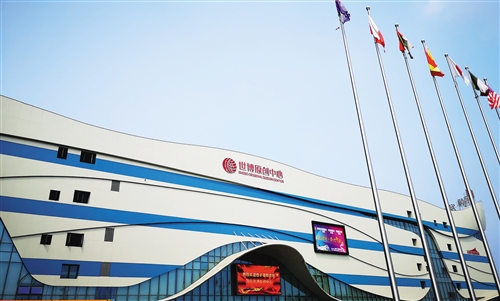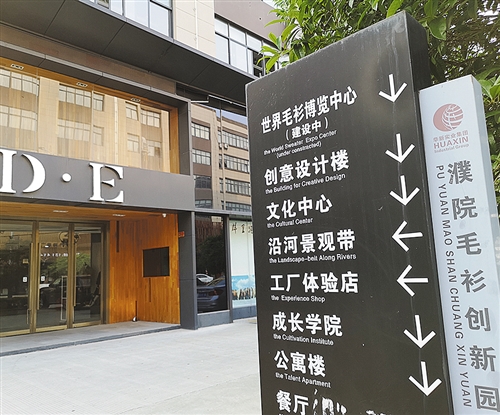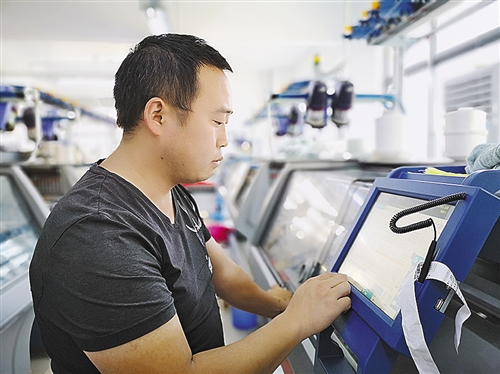Research on First-line Foreign Trade Enterprises: Where does the traditional small and micro enterprises come from?

The original Expo center created by Puyuan Sweater Innovation Park. Our reporter Li Zheshe

Corner of Puyuan Sweater Innovation Park. Our reporter Li Zheshe

The car stopper operates an integrated seamless machine in the intelligent weaving workshop. Our reporter Li Zheshe
Reading tips
Not long ago, the United States imposed new tariff measures on Chinese exports, including the textile industry. As an "ancient" traditional industry, the profit margin of textile industry is limited. Does the increase of tariffs have a great impact on enterprises? In Zhejiang Jiaxing Puyuan Sweater Innovation Park, a number of foreign trade enterprises not only solved the risks caused by tariff increase, but also gained more customers and orders by enhancing product competitiveness, expanding new global markets and improving their service capabilities to customers. Please follow the Economic Daily reporter into Puyuan Sweater Innovation Park to find out.
On the morning of September 8, there was a long queue in front of the omelet window of the cafeteria in the hotel of the town industrial park, among which there were many businessmen who spoke Japanese and Korean. Puyuan Town, a famous town of woolen sweaters in China, located in Jiaxing, Zhejiang Province, ushered in the purchasing season of woolen sweaters early.
A "small goal" of 100 million yuan
Products are competitive, and there is no business to do.
"My goal is at least 100 million!" Liang Wenmei is not Wang Jianlin. Four years ago, she just received her first foreign trade order — — 500 sweaters. For two years before, her foreign trade company didn’t make a penny. But in Liang Wenmei’s eyes, the company’s annual turnover reaches 100 million yuan, which is only a small goal.
More than 20 years ago, Liang Wenmei and Su Mingyuan, who just got married, left their hometown in Sichuan for Guangzhou with 300 yuan money, and began to struggle. They have knitted sweaters in factories, played with looms in rented houses and opened stalls in wholesale markets.
In 2005, Liang Wenmei was keenly aware that a group of customers suddenly appeared in the Guangzhou market. They spoke the same accent and picked up an amazing number of goods. After several inquiries, Liang Wenmei first heard the name of "Puyuan", a small town in Zhejiang. She immediately decided to leave the old market Guangzhou and go to the new market Puyuan to make a breakthrough in the world.
After opening a store in Puyuan for several years, Liang Wenmei, who loves tossing, has a new idea — — I want to do global business and sell sweaters to foreign countries. In 2013, Liang Wenmei took out all her possessions and established Zhejiang Kangying Clothing Co., Ltd., which specializes in foreign trade business.
However, Liang Wenmei, who has no foreign trade experience, has been drinking the northwest wind for two years.
The turnaround occurred in 2015. "I want to thank my first customer, who taught me how to do foreign trade business." At the Canton Fair that year, Liang Wenmei received the first order from Canada, 500 sweaters, amounting to more than 20,000 yuan. Liang Wenmei, who used to be a self-employed, didn’t know what a proforma invoice was and had never seen any formal forms. "I quickly save every email and every form sent by Canadian customers, and learn according to the appearance. This is how business is learned." Liang Wenmei said.
Soon, Liang Wenmei made her business in America. "In 2015, I received an order from American TJX company, which was also 500 pieces. This is a big brand. Later, we cooperated more and more. Now they give me large orders of more than 100,000 pieces a year, and the volume will definitely continue to increase in the future. " Liang Wenmei told reporters that since then, she has done more and more business with American customers. In the company’s turnover of 16 million yuan last year, American orders accounted for 60%.
When the reporter asked if he was worried about the customer’s stability and profit prospects in the face of the tariff increase, the hearty Liang Wenmei said loudly: "It doesn’t matter much to me to increase taxes, and I’m not worried. First of all, my products are unique in style, and I spend a lot of money on style development every year. It is difficult for Southeast Asian countries to make these styles, and American customers can’t change suppliers. "
It is precisely because her products do not follow the homogenization route and have strong competitiveness that Liang Wenmei has a strong voice when negotiating with customers. "Why don’t I worry? The second point is because all my foreign trade orders are based on ‘ FOB ’ Make a deal. In other words, I only need to send the goods to the port in Shanghai to complete the task. Prices such as freight and customs duties outside Shanghai port have nothing to do with me. " Liang Wenmei said.
So, who will bear the new tariff cost? Will American merchants reduce their orders for the coming year because of lower profits? "They had to raise prices, and finally American consumers bought the bill for tariffs." Liang Wenmei told reporters that her American customers have not only lost one, but also added a lot. In the first half of this year, her company even achieved an impressive performance of 80% year-on-year.
On August 13th, at the clothing exhibition in Las Vegas, Liang Wenmei gained unprecedented benefits. "Merchants are very interested in my products. There are many customers who place orders and take samples on the spot. My email response rate has reached 50% for the first time. It is expected that five or six companies will be transformed into long-term customers." Liang Wenmei said with a smile: "When I was working in a bank this morning, I received a phone call from the United States, saying that I would come to our company to see the products in October, which is very promising for cooperation."
In this regard, Liang Wenmei, who loves tossing, is not satisfied, and the new plan has broken ground. In order to get closer to customers, Liang Wenmei just registered a branch in Los Angeles last month, so that she can open up a bigger market in the United States.
"The market is so big, no matter what friction happens, as long as the products are good and there is no business to do. I believe that the small goal of 100 million yuan can be achieved in a short time. " Liang Wenmei laughed and told reporters: "Everything is just the beginning!"
Three Japanese customers came in a week.
Open up new markets and take the brand development route.
A sweater, tossed and turned, can’t find a seam. In the sample room of Jiaxing Gorgeous Sweater Technology Development Co., Ltd., the reporter found that the sweater here can be worn on both sides, because there are no seams on the inside and outside of the clothes.
Walking into the intelligent weaving workshop of Puyuan Sweater Innovation Park, the reporter understood the reason. "In traditional knitting, two sleeves and front and back are knitted by a flat knitting machine, and then the four sweater pieces are sewn up by the looper manually, and naturally there will be seams. With the most advanced integrated seamless machine, as long as the plate maker writes the program and the wool is connected, the machine can weave a complete sweater without a seam. After ironing the packaging, it can be shipped directly. " Shen Xiaoqi, general manager of Gorgeous Sweater Company, told the reporter.
The absence of seams is just one of the advantages of this machine. "Because of the elimination of manual looping, the use of all-in-one machine can save labor costs, shorten production time, and more importantly, avoid the impact of manual operation on quality uniformity, and the added value of products can be increased by about one-third." Shen Xiaoqi pointed to the sweaters in the sample room and said, "The sweaters produced by these all-in-one machines can sell for more than 1,000 yuan or even more than 2,000 yuan in shopping malls."
Good machines, naturally good prices. The price of this German brand all-in-one machine is as high as 580,000 yuan. Coupled with the high salary introduction and training of plate makers and car stoppers, a large-scale workshop needs at least tens of millions of yuan of investment.
"This investment is very worthwhile. My new clothes are very popular in the Japanese market and have received many orders." Shen Xiaoqi told reporters that in a few days, she will take these samples to Europe to see the market reaction.
Shen Xiaoqi, with a baby face, has entered the sweater foreign trade industry for almost 10 years. In the first few years, the orders she received were mainly from American supermarkets such as Wal-Mart, and most of them were "running orders". These orders were large in quantity, thin in profit and very sensitive to price. Later, with the increase of domestic labor costs and raw material prices, such orders were gradually transferred to Bangladesh, Vietnam, Cambodia and other countries.
In 2015, Shen Xiaoqi began to set up an R&D team, recruited designers and invested in established houses, bid farewell to the era of "price war" and turned to make a fuss about product quality. While slowly giving up the "running order" in the United States, Shen Xiaoqi has won many "small but refined" high-quality orders in new markets such as Japan and Italy, and the profit margin has also been improved.
"At present, the proportion of American orders of our company has dropped to more than ten percent. The increase in tariffs in the United States this time has an impact on us, but it can be tolerated. " Shen Xiaoqi told reporters that after learning the news of the tariff increase, she communicated with American customers, but the result was not satisfactory, and the other party asked her to bear most of the tariff costs.
"Fortunately, we have already begun to transform, upgrade product grades and develop emerging markets. Just this week, three Japanese customers came to our company to choose samples, and all of them were interested in products with higher added value. " According to Shen Xiaoqi, the turnover of Gorgeous Sweater Company was about 60 million yuan last year. Although some orders will be affected by the US tariff increase this year, fortunately, the share and profit margin of other markets are constantly improving, so it is expected that the operating income this year will not fall, but will be the same as last year.
While constantly developing new foreign trade markets, Shen Xiaoqi also turned his eyes to China. "The domestic market and the foreign trade market are completely different. To do foreign trade OEM, it is only necessary to produce according to the requirements of the order, and there is no need to directly face consumers. Doing domestic sales puts higher demands on brand, design and service capabilities. " Shen Xiaoqi said that with the transformation experience in previous years, she became more and more confident in her products. Last year, she registered two brands and was ready to start to deepen the domestic market and take the brand development route.
At lunch time, Shen Xiaoqi was not idle. She and her sister who came back from studying in Milan, Italy, kept pointing at the screen of their mobile phones and studied how their online stores could be improved to impress consumers with their products and brands.
"I won’t do it at this price."
Role change brings about the improvement of discourse power and bargaining power.
Near noon, Shen Qiang sat in the boss’s chair and looked out. The floor-to-ceiling window was bright and open, and his mood was more comfortable. In 2016, he founded Tongxiang Xindishang Fashion Co., Ltd., with a turnover of 11 million yuan in that year, which soared to 43 million yuan in the second year and doubled again in the third year, reaching 97 million yuan. In the first eight months of this year, the company’s revenue has already exceeded 100 million yuan.
This "rocket-like" performance is really surprising. With questions, the reporter walked into Shen Qiang’s company. The open space is full of plastic models dressed in fashion and design drawings on the wall, revealing a strong fashion atmosphere.
"Market fluctuations are not so terrible, and we have the strength to choose quality customers." Shen Qiang told reporters that before 2016, when he worked in other foreign trade companies, he mainly received low-priced orders from the United States, and the gross profit margin was even as low as 5%. "At that time, the company lacked the ability to develop products, and completely produced according to the order. In order to earn 50 cents more and 1 yuan money, it took huge risks, and it was possible to do business at a loss with a little trouble. If there is trade friction at that time, there must be many bankrupt companies. "
Seeing this, when he set up his own company, Shen Qiang resolutely refused to accept low-quality orders, but relied on "directional design". Different from the original design, "directional design" emphasizes more on the service ability to customers.
"For a big customer, we will have a team of at least 10 people. As long as the customer puts forward the directional demand, we will combine the latest fashion trends and propose a variety of design schemes, including styles, colors and materials selection. " Shen Qiang said that they extended from the downstream production link to the field of market research and design, so that they became not only a simple OEM role, but also a partner of customers.
The foundry can be replaced at any time, and the partner is not easy to find. The change of role has brought about the improvement of the right to speak and bargain. "The original way of sampling, proofing, quotation and production is completely in the hands of customers. Now, we have become participants in many links, and the right to speak has naturally improved. If the other party gives me a lower price, I can say rudely: ‘ I won’t do it at this price ’ 。” Shen Qiang told reporters.
Apparel industry seems to be traditional, but it requires quick response and innovation most. Fashion styles are fleeting, and the update speed is extremely fast. If you can’t respond quickly in design and production, you can’t talk about competitiveness. "Take my customer ZARA as an example. It is a typical example of fashion and quick sales. If it takes a month or two to make a sample dress like in the past, all the trends have passed, and the price is lower, the other party will not cooperate." Shen Qiang said that relying on the local complete industrial chain and strong service ability, his company can produce sample clothes for customers to choose within one day at the earliest.
"Unlike Chinese enterprises, the production cycle of enterprises in Southeast Asian countries is relatively long. First of all, in terms of raw materials, Southeast Asian countries generally only prepare conventional yarns, and most of the yarns, especially fashion yarns, have to be imported from China, which will increase a lot of transportation time. Secondly, the management level and worker efficiency of our company are significantly higher. " Shen Qiang said that this is also an irreplaceable important reason for China’s textile industry.
Practice your own skills and turn risks into invisibility. "The advantage of our company is here, and the country’s tax reduction and fee reduction are also great, and Sino-US economic and trade frictions have little impact. The original delivery date of the American order was September. After receiving the news of the tariff increase, the customer informed us to deliver the goods in advance, instead of shipping by sea, the extra freight was borne by the other party. In the end, it is still American consumers who pay this money. It is estimated that clothes that originally sold for $10 will rise to $11. " Shen Qiang said.
"But for ordinary processing plants that fight price wars, the impact will be great, and they can’t afford the new tariffs. If American importers are hit by tariffs to poor management or even bankruptcy, resulting in malicious discounts or cancellation of orders, the risk is even greater. " Shen Qiang believes that this is actually a reshuffle and a wake-up call to the industry. If backward production capacity with poor management, high energy consumption and no core competitiveness is eliminated, the whole industry will embark on a higher quality development path.